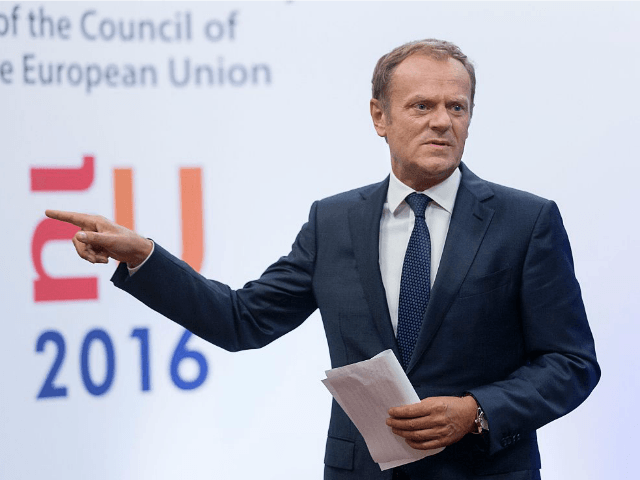WARSAW, Poland (AP) — Poland’s most powerful politician, Jaroslaw Kaczynski, says it’s not in his country’s interests for Donald Tusk to serve a second term as head of the European Council, a key European Union leadership position.
Poland is the only EU state openly opposed to a second 2½-year term for the former Polish prime minister, whose current term ends in May. The European Council brings together leaders of the 28 member states to determine the bloc’s political priorities, and the question of a second possible term for Tusk is expected to be taken up at an EU summit in early March.
Kaczynski, the head of the conservative ruling party and a longtime political rival of Tusk’s, noted Tusk had backed an EU proposal to fine countries that wouldn’t accept refugees in a settlement plan. That proposal failed in part due to Polish opposition.
Kaczynski said in an interview on state television Thursday that such fines would have cost Poland 3 billion euros.
“It is not in Poland’s interest for someone like that” to head the European Council, Kaczynski said.
Tusk was Poland’s prime minister in 2010 when Kaczynski’s twin brother, President Lech Kaczynski, died in a plane crash near Smolensk, Russia, along with 95 other Poles, many of them high-ranking state and military officials.
Kaczynski has long maintained that Tusk bears some moral responsibility for that tragedy, accusing him of not assuring better security procedures for the president.
He spoke after the Financial Times reported, based on unnamed EU diplomats, that Kaczynski recently told German Chancellor Angela Merkel that Poland might issue a “European arrest warrant” against Tusk for his role in the Smolensk tragedy.
There was no immediate response from Tusk’s office to Kaczynski’s comments on Polish television.
But in an apparent reference to Kaczynski’s reported comments to Merkel, Tusk wrote on Twitter on Thursday: “Is it nice to report on a Pole to the Germans like that?”
His message, in Polish, ended with a smiley face. Poles would understand the reference to Poland’s history of being under German occupation during World War II, when reporting to the Germans would be considered the worst form of betrayal. The comment took a dig at Kaczynski’s own Polish nationalism, which is often infused with a dose of anti-German sentiment.

COMMENTS
Please let us know if you're having issues with commenting.